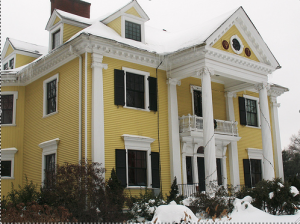I now have finished my first semester at Trinity College and I am going on break knowing a lot more about life in college than I did a few months ago. I have learned the best study and organization habits for myself and I now know exactly what I need to do next semester in order to do even better academically. In Andrew Roberts’ The Thinking Student’s Guide to college: 75 Tips for Getting a Better Education he gives incoming college students helpful advice on how to succeed in college. One of his pieces of advice that I think is very important after going through one semester of college is tip 45: ‘Manage your time’. He says that rather than trying “to sneak in five minutes of studying here and ten minutes there” that students should “set aside several hours each day that you devote fully to your classes” [1. Andrew Lawrence Roberts, The Thinking Student’s Guide to College: 75 Tips for Getting a Better Education (University of Chicago Press, 2010)] if you want to succeed academically in college.
Although managing your time as explained in tip 45 is a big part of succeeding I have learned that it is not enough if you wish to excel in your classes. Studying the material that you learned in class right after you leave the class helps it become engraved in your brain while the topic is still fresh on your mind. Studying in between classes is a great compliment to managing your time. Other than the fact that it helps you understand the material better it also allows you to do it much faster because everything you were just taught in class is still in your mind so you do not have to spend any time re-teaching yourself anything when you go to study. From my experience as a freshman at Trinity when I study material from class right after I leave the class I always know that information much better than when I wait and go to the library at night or the next day. Then when I go to the library to study further at night I feel as if the subject matter clicks much quicker than if I hadn’t studied in between my classes.
In my most difficult class of my first semester, comparative urban politics, I had a lot of trouble getting good grades during the first few weeks. I thought that I was studying really hard for all of my tests and in reality I was but the problem was that I just wasn’t studying the right way for me to able to retain as much information as possible. What I would do is go to class and then either study later at night or the next day and I realized that although I spent a lot of time in the library trying to study everything that happened in class I couldn’t remember certain specifics that had happened in the prior class. Once I started studying directly after class and before my next class for only about a half hour I noticed that when I went to study at night that much more of the information that was taught in class was still in my head. As a result of following up the initial class with a short study period I was able to remember a lot more of what happened in that class when I went to study again at night and it showed on my next tests. My grade started to drastically improve and I accredit it all to my new study method. If only I had figured it out sooner.
By studying in between classes more you will find that you will have much more free time because though you will not be studying for as much time the quality of your studying is significantly better. You will be able to have your nights free to do things like workout, hangout with friends, or participate in school clubs is an added benefit on top of increasing your grade point average.
After reading Andrew Roberts’ book I have really come to appreciate the advice that he gives and the majority of what he says is actually very useful in order to be a successful college student. I agree with many of the things he said and have adapted to make them a part of my academic life so that I can better myself academically. However, one thing that I disagree with about the book is that it should be read before school. Personally I am big believer of learning from experience and that’s what I did my first semester at Trinity and although I may have done slightly better academically if I had read the book earlier I would not change what I did. My advice to any students would be to learn from your mistakes in your first semester in college and if you still have not found a good way to achieve academic success then to read Andrew Roberts book. But be warned, once you read this book you will have all the knowledge you will need in order to succeed in college so you have no more excuses for doing poorly in school.
